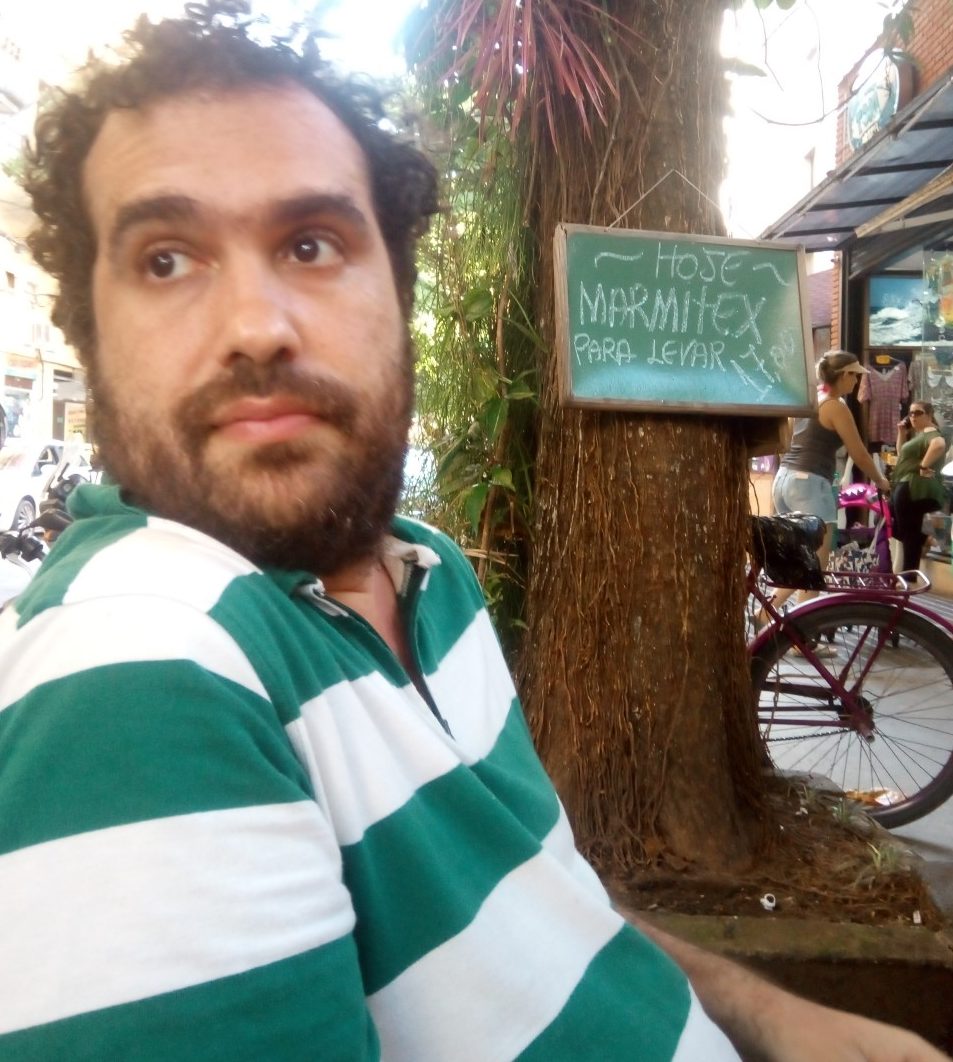BABE, TERROR, the nom-de-musique of São Paulo’s Claudio Szynkier, is a serious sort of name. That juxtaposition: your babe, your loved one, terror. Oh.
… but then these are serious times, and if you think we’ve got it bad in the UK currently, then try the Brazil of the Brazil of an emergent populist, Covid-denying right: the milieu which Claudio is currently living, breathing. It’s a place where, as with the Tropicalia movement of the late 1960s, that meeting of creative minds that gave us Gal Costa, Os Mutantes, et cetera, music-making itself has become a political act not without risk.
And he’s chosen to premiere a track from his new, experimental album, Horizogon, with Backseat Mafia.
But Claudio, Babe, Terror, is a man of deep artistic and creative conviction. Things may be more difficult than he had dared imagine just two years ago, but that hasn’t stopped him, and his new album, Horizogon, is now scheduled for a September 15th worldwide digital release. It’s a deeply layered album with an equally layered back story. Read on.
Claudio has been fashioning intelligent ‘tronica since 2008; he’s resident in São Paulo, Brazil, currently also enjoying infamy as an epicentre of COVID-19 transmission.
Horizogon is his 11th album. He began with a clutch of releases on his own Perdizes Dream imprint, before graduating to Errol Alkan’s Phantasy Sound in 2017 for the release of his nautically themed album, Ancient M’ocean, which featured just dizzying and texturally offbeat conceptions as “Windsurf For Souls II”.
A year later, he self-released A Creamy Crambled Suite For a Ride, sound-sourcing a four-part, 25-minute suite entirely from Oxford’s premiere shoegazer’s Weather Diaries album. And they liked it so much it was included as extra material on its Japanese issue.
And Horizogon arrives on the back of a serious health crisis last year: it could even conceivably be his last. “I have an autoimmune syndrome that affects my ear, causing varied dysfunctions, sounds, pain and dizziness,” Claudio says; “[my], hearing has better and worse periods.
“Last year, when things got a little better, I sank in the Horizogon tracks … trying to capture possibilities.
“I don’t know when I’ll be able to release a new album, if I will be able to craft like this again, because to preserve my hearing I can’t put so much effort and pressure into this.”
Eerily, it’s an album made in a self-imposed, health-related lockdown that predates the current pandemic. Watch and listen to the eerie and enveloping textures of “Salina Lúmen”, paired as it is with film of his own city filmed leading into and during the early days of lockdown. A choir begins proceedings, to be overtaken by a piano tick-tocking and meandering across a drunken scale; there’s granular hiss as if it’s all coming at you over longwave. The piano flourishes and asserts, becomes a creature of a mournful, late night bar; double bass hears the call and arrives.
There’s footage of the tail end of the São Paulo carnival, the last gasp of public life immediately before Covid measures were put in place; a jazz sax improvises and blows. It’s only some six or so minutes in that anything approaching electronica arrives, in the shape of a repeating sequencer motif.
The whole effect is as if driving late at night in an area of limited reception, the dials sliding and grabbing at a selection of evocative and chance stations. It’s really reminiscent of the deep memory bycatch of The Caretaker; and, with the political situation, perhaps even the Godspeed You! Black Emperor of Slow Riot For New Zero Kanada in that right-angled musical opposition to the domestic political status quo.
He talks of the current political situation with sadness and anger: “This was already an apocalyptic moment in Brazil before the COVID-19 quarantine, to the point where you walk on a street, go to the supermarket and people really feel free to attack whomever they consider ‘bearded vagabonds’ and ‘communists’; and that was definitely fuel for the record.
“I have already been the target of bots, lies and everything else; [I’ve] lost jobs, my money ran out and my friends began a Crowdfunder against fascism so I could film my Horizogon videos. But it made the record more alive.
“Horizogon is the new, old town of [São Paulo] after coronavirus,” Claudio says.
“I feel … like a dreamer who had one of his dreams strangely materialized.
“Maybe it’s one of the reasons why the record sounds cryptic and dawnlike, twilit.
“I’ve lived a kind of internal apocalypse, and I had not much more than the open city at dawn to save me. I composed the music and thought of it as a soundtrack from an apocalyptic São Paulo, but a calm and utopian apocalypse.
“A friend of mine said it sounds like lost vinyl from some obscure Swedish jazz musicians recording American cinema music in the 80s, and nobody [at the time] paid any attention to it; I think it has that feel, maybe.”
There’s a film for every one of the album’s six tracks, which he made in consort with film-maker Cauê Dias Baptista (for more on Cauê visit his Facebook page).
“I want to release all six, each one for a different theme, on the day the album is released on Bandcamp. There will be a cassette release as well, later I think, and the film release itself, with some extra footage,” Claudio says.
“There is a lot of [footage from] the international airport, Cumbica, one day before quarantine began.”
Babe Terror’s Horizogon will be released digitally on September 15th; a physical release by Los Angeles’ label Glue Moon Tapes will follow. Buy your digital copy here.
You can also follow Babe, Terror on Facebook and Twitter.














No Comment